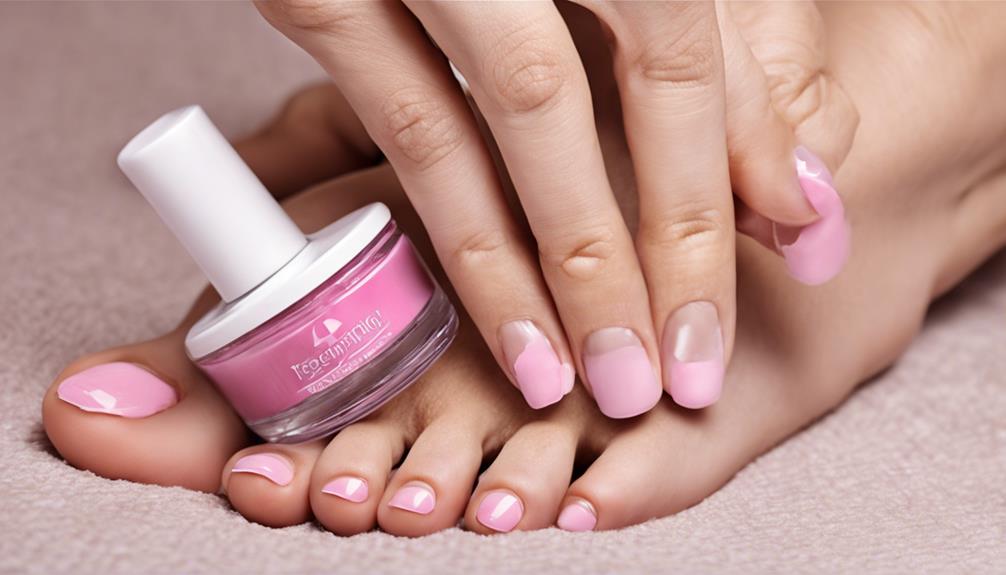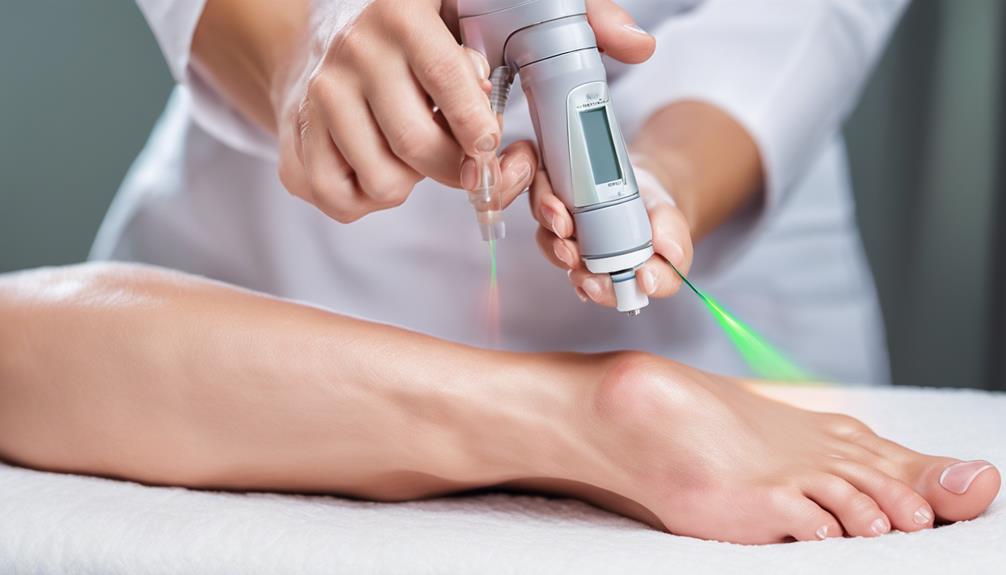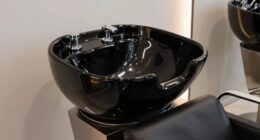When managing nail fungus while pregnant, prioritizing safe treatments is crucial. Topical antifungals, such as nail creams or solutions, are advisable because they directly combat the infection on the nail’s surface with a minimal risk of adverse effects. It’s essential to consult with a healthcare professional to choose the best treatment option. Moreover, alternative treatments like laser therapy and medicated nail polish may be explored for a targeted method of dealing with the infection.
Various home remedies like tea tree oil, vinegar soaks, and coconut oil also offer gentle alternatives. These options provide effective and safe choices for pregnant women managing nail fungus, ensuring maternal health is prioritized.
Key Takeaways
- Topical antifungals like nail creams are safe for pregnant women.
- Medicated nail polish, such as Ciclopirox, is effective and recommended.
- Consider natural remedies like tea tree oil or vinegar soaks.
- Laser therapy offers a non-invasive alternative for severe cases.
- Consult a healthcare provider for the most suitable treatment option.
Topical Treatments for Nail Fungus
When managing nail fungus during pregnancy, opting for topical treatments is recommended to minimize potential risks associated with systemic medications. Topical antifungals, such as nail creams or solutions, are commonly used in pregnant women to treat nail fungus. These treatments work by directly targeting the fungal infection on the nail surface, offering a more localized approach compared to oral medications. Pregnant women often prefer topical treatments due to their safer profile and lower risk of systemic side effects for both the mother and the baby.
Consulting with a healthcare provider before starting any treatment is essential to guarantee the safety and effectiveness of the chosen topical antifungal. Healthcare providers can recommend the most suitable topical treatment based on the individual's health status and the severity of the nail fungus. By following professional guidance and using topical treatments as directed, pregnant women can effectively manage nail fungus while prioritizing the well-being of themselves and their baby.
Oral Antifungal Medications for Pregnant Women

When considering oral antifungal medications for pregnant women with nail fungus infections, safety is paramount.
While Lamisil is considered safe during pregnancy, close monitoring of liver health is essential due to potential risks.
It's vital for pregnant individuals to consult their healthcare provider before initiating any oral antifungal treatment.
Oral Antifungal Safety
Consulting a healthcare provider before considering the use of oral antifungal medications like Lamisil for treating nail fungus during pregnancy is essential due to limited safety data available. While oral antifungal medications are commonly used for nail fungus, their safety in pregnancy remains a concern. It's important to involve a doctor in the decision-making process to guarantee the best possible outcome for both the mother and the baby.
Monitoring liver health during treatment with oral antifungal medications is particularly significant. Although these medications can promote healthy nail growth, their usage in pregnancy requires careful consideration due to the potential risks involved. Given the limited safety data on oral antifungals in pregnancy, caution and expert guidance are advised when exploring these treatment options.
Alternative Treatment Options
When contemplating treatment options for nail fungus during pregnancy, it's important to explore safe alternatives due to the limited safety data on oral antifungal medications.
In this regard, alternative treatments such as laser therapy and other topical solutions can offer effective and safe options for pregnant women. Laser therapy, like the Lunula cold laser treatment, provides a non-invasive approach to treating nail fungus without posing risks to the mother or baby.
The cool wavelengths of light used in Lunula laser therapy have fungicidal effects and are known for their high success rates. This innovative approach offers pregnant women a promising solution for managing nail fungus safely and effectively.
Medicated Nail Polish for Fungal Nails

Medicated nail polish, such as ciclopirox, presents a vital and effective treatment option for fungal nail infections in pregnant women. This prescribed antifungal agent is considered a suitable choice during pregnancy due to its safety profile.
The treatment involves daily application of the medicated nail polish along with weekly cleaning to maintain efficacy. It's essential to adhere to the recommended regimen, which may extend up to a year to effectively address the fungal infection.
By offering a localized treatment approach, medicated nail polish guarantees the safety of both the mother and the baby. This innovative method provides pregnant women with a practical solution for managing fungal nail infections without compromising their health or that of the developing fetus.
When dealing with fungal nails during pregnancy, consulting a healthcare provider for proper diagnosis and treatment guidance is critical to safeguard the well-being of both the mother and the baby.
Surgical Options for Nail Fungus

In severe cases of nail fungus that don't respond to other treatments, surgical options may be considered for effective intervention. Surgical removal of the infected nail is sometimes necessary to treat the fungal infection successfully. After this procedure, new nail growth is expected to gradually replace the infected nail.
Laser therapy presents a non-invasive surgical alternative for treating nail fungus, offering an innovative approach to destroying the fungus. Recovery following surgical or laser therapy for nail fungus may take up to a year for complete healing and regrowth of a healthy nail.
- Surgical options for nail fungus may include the removal of the infected nail to eradicate the fungal infection.
- Laser therapy offers a non-invasive approach to treating nail fungus by destroying the fungus with targeted light energy.
- Expect new nail growth after surgical intervention, allowing for the gradual replacement of the infected nail with a healthy one.
Laser Therapy for Fungal Nails

Laser therapy for fungal nails offers a highly effective treatment option for pregnant individuals seeking safe solutions. During treatment, safety considerations are paramount to guarantee the well-being of both the mother and the baby.
Understanding the recovery process after laser therapy is essential for managing expectations and optimizing outcomes.
Laser Effectiveness Explained
Utilizing advanced cool wavelengths of light, the Lunula laser effectively targets fungal nail infections with high success rates and minimal discomfort, making it a preferred choice for pregnant women seeking safe treatment options.
This innovative laser therapy is safe to use and offers the following benefits:
- Non-invasive procedure
- Painless treatment option
- High patient satisfaction rates
The Lunula cold laser technology poses no risks to the mother or baby and has been shown to achieve fungicidal effects on infected nails. Studies have demonstrated its efficacy in treating fungal nail infections, providing pregnant women and individuals with diabetes a reliable and effective solution for addressing this common issue.
Safety Considerations During Treatment
With the safety of pregnant women in mind, key considerations during laser therapy for fungal nails include ensuring that the laser technology emits cool wavelengths of light to prevent harm to the mother or baby. Laser therapy, especially using the Lunula cold laser, is a vital treatment option for fungal nail infections during pregnancy due to its non-invasive nature, which reduces risks for pregnant women. Following all safety protocols recommended by healthcare providers during laser treatment is essential to optimize the procedure's effectiveness while maintaining the well-being of both the mother and the developing fetus.
Prioritizing these safety considerations can lead to successful outcomes in treating fungal nails without compromising maternal or fetal health.
Recovery After Laser Therapy
Considering the swift restoration and minimal downtime associated with laser therapy for fungal nails, patients can smoothly transition back to their regular activities post-treatment without the need for extended healing periods. This non-invasive procedure guarantees a comfortable and painless experience, allowing individuals to resume their daily routines immediately.
The effectiveness of laser therapy becomes apparent over time, as the new healthy nail gradually grows out, typically over several months. Additionally, unlike surgical options, laser therapy doesn't involve cutting or removing the nail, contributing to a faster and smoother recovery process.
Natural Remedies for Nail Fungus During Pregnancy

When addressing nail fungus during pregnancy, natural remedies like tea tree oil, garlic, and lavender oil offer safe alternatives for treatment. Tea tree oil, known for its antifungal properties, can help combat nail fungus when applied topically. Similarly, garlic, with its antimicrobial and antifungal properties, may aid in fighting the infection. Lavender oil, a natural antiseptic, could also assist in treating nail fungus during pregnancy.
Other safe options for treating nail fungus naturally while pregnant include white vinegar, bicarbonate of soda, and mouthwash. White vinegar can create an environment that's hostile to fungi, helping to eliminate the infection. Bicarbonate of soda may help to alkalize the affected area, potentially inhibiting fungal growth. Mouthwash, with its antifungal properties, could also be effective in combating nail fungus.
It is essential to consult with a healthcare provider before using any natural remedies for nail fungus while pregnant to guarantee the safety and effectiveness of the treatment.
Home Remedies Safe for Pregnant Women

Pregnant women can safely explore various natural remedies to address nail fungus, ensuring both effectiveness and the well-being of the unborn baby. When considering home remedies safe for pregnant women dealing with nail fungus, prioritizing gentle and non-invasive options is crucial.
Some natural remedies to explore include:
- Bicarbonate of soda: A common household ingredient that can help combat nail fungus.
- Cornmeal: Soaking the affected nail in a cornmeal-water solution may aid in fighting the infection.
- White wine vinegar: Known for its antifungal properties, white wine vinegar can be a safe option for pregnant women.
These natural remedies offer pregnant women alternatives to traditional medications, promoting a more holistic approach to nail fungus treatment. By opting for these gentle remedies, pregnant individuals can address fungal nail infections while safeguarding the health of themselves and their unborn child.
Tea Tree Oil Treatment for Nail Fungus

Tea tree oil offers antifungal properties that can effectively combat nail fungus.
When used carefully during pregnancy, it can be applied directly to the affected nail daily for mild infections.
Seeking medical advice before using tea tree oil is important for pregnant women to guarantee both effectiveness and safety.
Tea Tree Oil Benefits
With its potent antifungal properties, tea tree oil provides an effective natural remedy for combating mild nail fungus infections. Tea tree oil benefits include:
- Antifungal Properties: Tea tree oil is known for its ability to fight fungal infections on the nails.
- Natural Remedy: It offers a chemical-free solution for addressing mild cases of nail fungus.
- Gentle Treatment: Tea tree oil can be a gentle yet effective option for individuals looking for natural alternatives.
These benefits make tea tree oil a popular choice for those seeking innovative solutions to treat nail fungus. It's essential to use this remedy cautiously, especially during pregnancy, due to potential safety concerns for unborn babies.
Application Tips
To effectively apply tea tree oil for treating nail fungus, it's important to make sure the affected nail is thoroughly cleaned and dried before the application. During pregnancy, it's essential to prioritize safety and consult a healthcare provider before using tea tree oil.
When applying tea tree oil, confirm it's directly administered to the affected nail, allowing it to penetrate the fungus effectively. Pregnant individuals should exercise caution to prevent any adverse reactions. If there are any signs of irritation or if the condition worsens, seeking medical advice promptly is recommended.
Vinegar Soaks for Nail Fungus

Using vinegar soaks as a natural remedy can aid in treating nail fungus by creating an acidic environment that inhibits fungal growth. Soaking the affected nails in a mixture of water and vinegar for 15-20 minutes daily can help improve the condition.
Vinegar's antifungal properties can help combat the fungus responsible for the infection. The acidity of vinegar can also help restore the pH balance of the nails, creating an inhospitable environment for fungi. Consistent use of vinegar soaks as a natural remedy may show gradual improvement in fungal nail infections.
Vinegar soaks offer a safe and potentially effective way to address nail fungus, especially for those seeking natural alternatives during pregnancy. It's crucial to consult with a healthcare provider before starting any treatment, even natural remedies, to make sure it's safe for both the individual and the developing baby.
Coconut Oil Remedies for Fungal Nails

Pivoting from the discussion on vinegar soaks for nail fungus, exploring the benefits of coconut oil remedies for fungal nails reveals a natural and safe alternative for combating fungal infections, particularly during pregnancy. Coconut oil possesses antimicrobial properties that can aid in addressing fungal nail infections. Daily application of coconut oil to the affected nail can help hydrate the nail while potentially hindering fungal growth.
This natural remedy is considered vital for use during pregnancy, offering a gentle approach to treating fungal nail infections. Consistent use of coconut oil may contribute to enhancing the appearance and health of the infected nail over time. However, it's essential to seek advice from a healthcare provider before utilizing coconut oil or any other remedy for fungal nail infections during pregnancy.
Frequently Asked Questions
Can I Treat Nail Fungus While Pregnant?
Yes, we can safely treat nail fungus while pregnant. Topical antifungal treatments are recommended due to limited safety data on systemic medications. Cold laser therapy, like the Lunula laser, offers a safe and effective option for pregnant individuals.
What Antifungal Creams Can You Use While Pregnant?
We can safely use topical antifungal creams like clotrimazole and miconazole while pregnant. These creams are applied directly to the affected nail, minimizing systemic absorption and potential risks. Always consult a healthcare provider for guidance.
What Foot Fungus Cream Is Safe During Pregnancy?
During pregnancy, it's important to prioritize safe options for nail fungus treatment. Consult a healthcare provider before using any foot fungus cream. Opt for topical antifungal creams like clotrimazole or terbinafine, and consider non-invasive options like laser therapy for effective treatment.
Can I Use Kerasal While Pregnant?
Yes, we can use Kerasal while pregnant. It is generally safe for pregnant individuals and helps improve nail appearance affected by fungus. Kerasal is low-risk, free of harsh chemicals, but consult your healthcare provider for safety assurance.
Can Pregnant Women Safely Use Nail Salon Fungus Treatment Options?
Pregnant women should use caution when considering nail salon fungus treatments. It’s essential to consult with a healthcare professional before using any treatment to ensure the safety of the fetus. Some ingredients in nail salon fungus treatments may pose a risk to pregnant women and their babies.
Conclusion
To sum up, pregnant women have several safe options for treating nail fungus.
Whether opting for topical treatments, oral medications, medicated nail polish, surgical procedures, laser therapy, or home remedies like tea tree oil, vinegar soaks, or coconut oil, there are effective solutions available.
By consulting with a healthcare provider and choosing the best treatment for their specific needs, women can safely address nail fungus while pregnant.
Remember, it's important to prioritize both the health of the mother and the baby.









